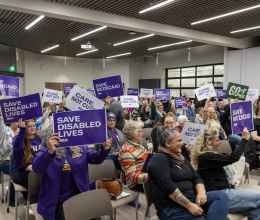
DENVER – Adams State University has agreed to rescind a “No Trespass Order” banning Danny Ledonne, a former professor who publicly criticized administration practices, from its Alamosa, CO campus and to pay $100,000 to settle a lawsuit filed by the ACLU of Colorado based on claims that the university violated Ledonne’s free speech and due process rights.
“The ACLU of Colorado brought this suit to vindicate Danny Ledonne’s First Amendment rights and his right to due process of law,” said ACLU of Colorado Legal Director Mark Silverstein. “By summarily banning Danny from a public campus and falsely labeling him a security threat, without providing any opportunity to rebut the false allegations, the university deprived him of due process and unjustifiably retaliated against him for his constitutionally-protected criticism of university practices.”
From May 2011 to June 2015, Ledonne taught in the Mass Communications program and performed video production work for Adams State University. In September 2015, after his employment at the university had ended, he launched WatchingAdams.org. On October 12th, Ledonne posted a series of articles on the site criticizing the pay disparity between faculty and the administration and alleging that the university had violated the Colorado Wage Act by not making timely payments to adjunct professors.
Two days later, University President Beverlee McClure issued a “No Trespass Order” to Ledonne. The order declared that for “an indefinite period of time,” Ledonne was prohibited from being on Adams State University property and that his presence on campus “would result in his immediate arrest for trespass.”
In an attempt to justify the ban, university officials, including McClure, made multiple unsubstantiated public claims that Ledonne had engaged in “harassment,” “direct and indirect threats,” and “terrorism.”
“Throughout the course of the litigation, Adams State University was not able to produce a single piece of evidence that Danny Ledonne ever engaged in any threats of violence, direct or indirect, toward anyone or anything at the university,” said Silverstein. “The University had no legitimate basis for banning Mr. Ledonne from campus, nor did university officials have any factual basis for the stigmatizing and derogatory characterizations of Mr. Ledonne that they communicated to the university community and the public.”
The ACLU of Colorado filed suit in February challenging the campus ban. As depositions were about to begin, the parties participated in a mediation before a former federal judge that resulted in a settlement agreement, which was finalized and signed last week.
“We hope that, as a result of this lawsuit, Adams State University recognizes that the public areas of its campus are a valuable cultural and educational resource not just for ASU faculty, staff, and students, but also to the residents of the greater San Luis Valley,” said ACLU cooperating attorney Reid Neureiter of Wheeler Trigg O’Donnell LLP, who represented Ledonne on a pro bono basis. “We also expect that Adams State will take appropriate steps in the future to ensure that any person subject to being barred from campus will receive fair notice and a reasonable opportunity to challenge the decision before an impartial decision-maker.”
“I sought this legal action to challenge the university’s heavy-handed attempt to discourage me and others who disagree with the administration from speaking out. I could not have done so without the incredible support and assistance of the ACLU of Colorado, and the pro bono lawyers from Wheeler Trigg O’Donnell,” said Ledonne. "I am very satisfied with the settlement and look forward to continuing my work in this community.”
Ledonne was represented by cooperating attorneys Neureiter, Kayla Scroggins, and Kendra Beckwith from Wheeler Trigg O’Donnell and Silverstein and Sara Neel from the ACLU of Colorado.
